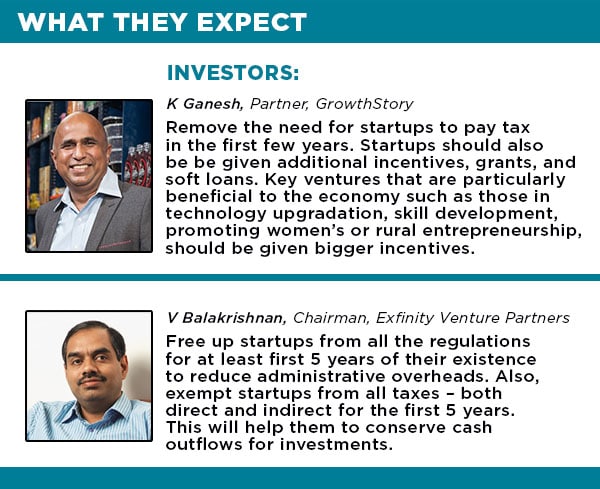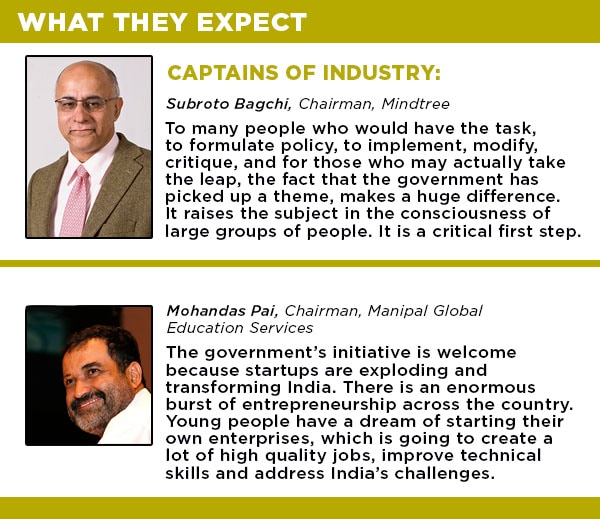A good time to start up
India can be the startup capital of the world if the much awaited startup policy, to be announced on January 16, delivers. Forbes India speaks to all stakeholders to get a ringside perspective of how


A large pool of engineering talent, a strong inflow of venture capital money and a fast evolving consumer mindset all put together has fuelled the growth of startups in India. And the numbers do tell a story. According to a report released in October 2015 by IT-industry trade body Nasscom, India is the third-largest start-up ecosystem globally, after the US and the UK, with a total of over 4,200 startups (largely technology enabled) and growing. It is also one of the fastest growing start-up eco-system in the world attracting a staggering $9 billion in investments and creating 80,000 jobs last year.
The central government on its part has taken cognisance of this and is now all set to usher in a policy that would support the spirit of entrepreneurship. On January 16, the government will announce the country’s first ever Start-up policy at an all-day event in New Delhi that will play host to the world’s most storied startup founders and investors. Some of whom include Travis Kalanick founder of taxi hailing mobile app Uber and Masayoshi Son founder of Japanese conglomerate SoftBank, a big-ticket investor in Indian startups.While the contents of the Start-up policy are closely guarded, entrepreneurs, investors, and industry leaders share their views with Forbes India on what the government should be doing to make India the startup capital of the world. “With the average age of founders being less than 30 years the startup ecosystem represents the confident, young and aspirational India. In the early nineties the IT-services industry created a global success story. I am confident that technology startups can script a similar success story,” says V Balakrishnan, chairman, Exfinity Venture Partners, an early-stage fund focussed on investing in technology startups.
“Mass scale job creation and sustained growth will happen only if we encourage the young generation to start businesses instead of becoming employees,” believes Bengaluru-based serial entrepreneur and angel investor K Ganesh. His vision of a new India driven by high-octane entrepreneurial energy is similar to that of Narendra Modi-led NDA government. But, the nagging question is will the government’s Start-up policy deliver on expectations?
Shrikrishna Ramamoorthy, Partner, Unitus Seed Fund says, “In order of priority the three main areas of focus (of the Start-up policy) should be: to enable the startup ecosystem, remove impediments, and give support through incentives and encouragement.” Beyond these broad contours entrepreneurs and investors seek changes to a slew of existing norms that govern doing business in India. Kunal Bahl, co-founder and CEO of Snapdeal points out that single window clearance facilities need to be tailored to ensure simplicity in compliance (for startups). “This coupled with a unique Business ID number which may be used across applications, as proposed by a Parliamentary panel on Ease of Doing Business, will significantly reduce administrative burden for young businesses,” he says.Ganesh, citing the World Bank’s Ease of Doing Business report of 2016, says it takes 29 days to start a business in India as compared to 15 days in South Asia and 8 days in member countries of the Organization for Economic Cooperation and Development (OECD).
“Raising funds from overseas investors, closing down companies, mergers and acquisitions are some processes that involve a lot of paperwork. Easing the norms for these processes will also help speed things up and enable startups to run efficiently,” adds Girish Mathrubootham, founder and CEO, Freshdesk.
Then comes the critical task of defining the term startup. According to Ganesh one definition that can be used is any business that employs less than 50 people and has a revenue of less that Rs 5 crore annually for the first three years of its existence. It would be interesting to note how the policy deals with this subject.
Moving on, a back-of-the-envelope estimate shared by Mohandas Pai chairman of Manipal Global Education Services, shows that close to 70 percent of the top 200 startup ventures in the country have re-domiciled outside of India. “They started in India, but shifted their headquarters outside of the country because they find it difficult to get capital, structure their organisations, sell-out, among others reasons,” says Pai, who is also an active investor. And that’s a reason why, he adds, that the government wants to have a policy to encourage entrepreneurs to stay in the country. “We are a very young country and that’s why a startup policy is very important,” says Pai.
Shashank ND, founder and CEO of Bengaluru-based healthcare startup Practo is hopeful that the government’s Start-up policy initiative will kick-start a new revolution. “It will be a catalyst for start-ups. It will just go to show that this country has enormous amount of energy, innovation and talent. If we channelise in the right way, it can create an impact that will change the future.”As the saying goes ‘the proof of the pudding is in the eating’ and the success of this startup policy will only be known after a while. However, the efforts taken by the government to reach out to India’s youth is being appreciated.“When a Prime Minister’s vocabulary includes the words ‘start up’ , in itself, it is a huge thing that can have cascading impact beyond what meets the eye in the near term. No Indian Prime Minister, until now, had spoken those words,” says Subroto Bagchi, chairman of IT-services company Mindtree. He adds, “When I look at the start-up activity flourishing in the US and Europe today, I see the connection between empathetic governments, society and the microbial world of start-up entrepreneurs.”
In India, we definitely see the coming together of this symbiotic environment.
(With additional reporting by Shutapa Paul in New Delhi)
First Published: Jan 12, 2016, 14:52
Subscribe Now

